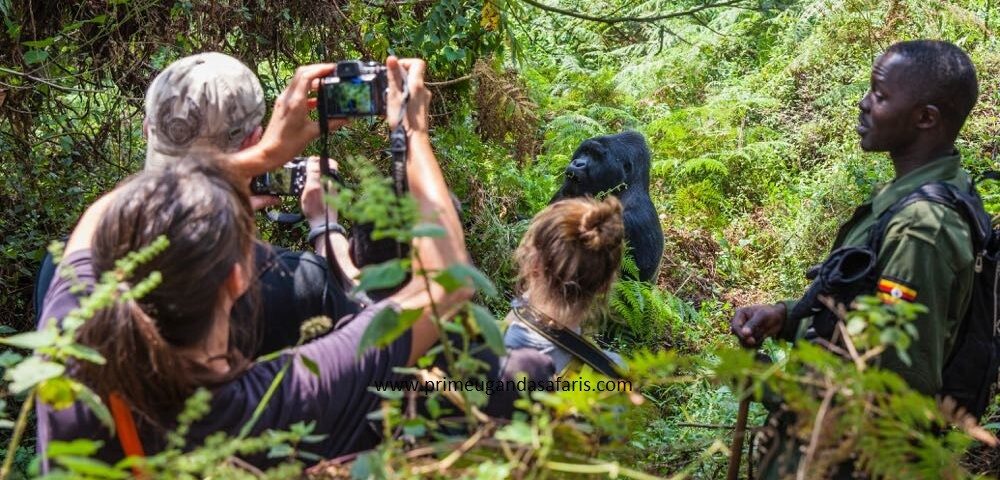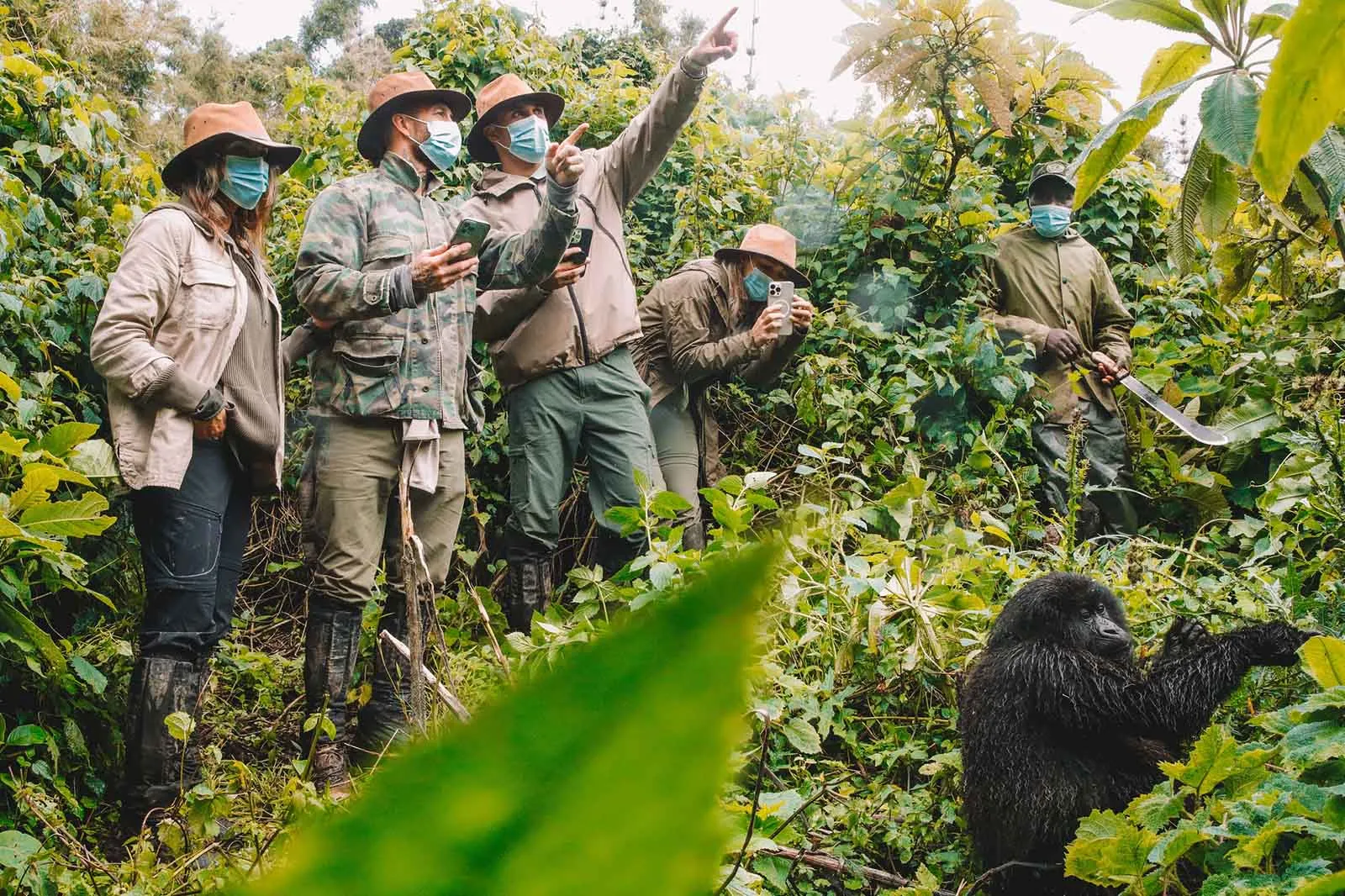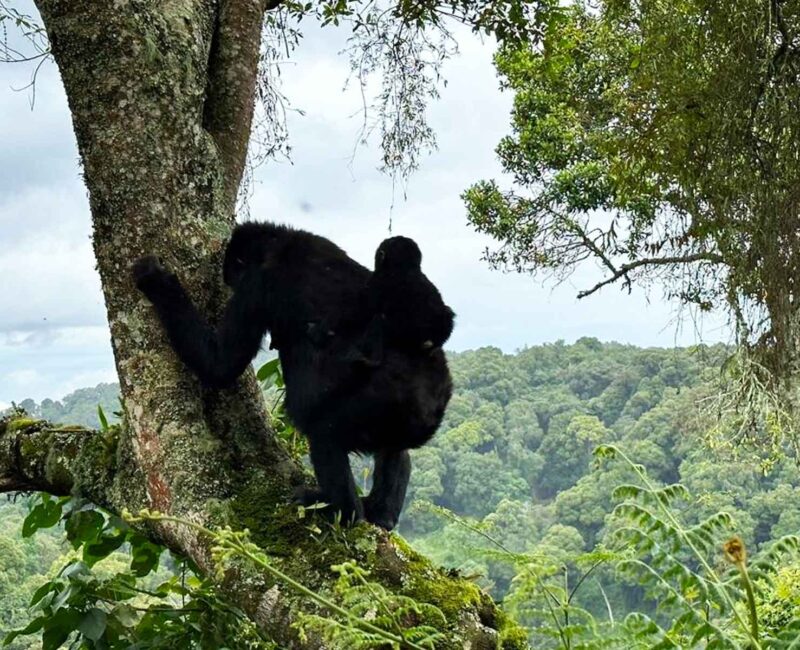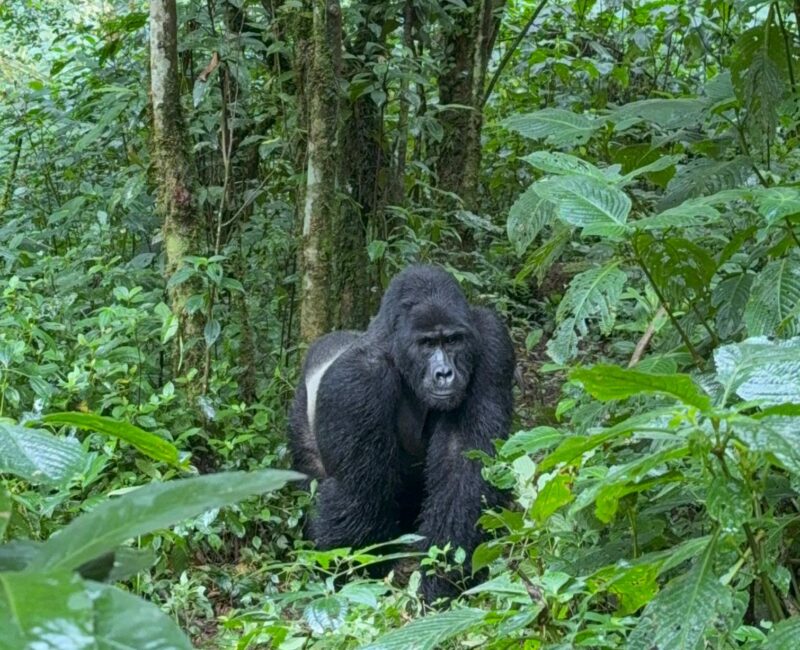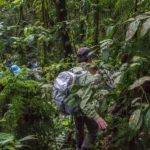
Uganda Gorilla Trekking for People with Physical Constraints
October 7, 2025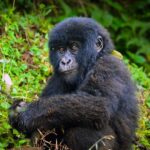
How Safe Gorilla is Trekking in Uganda
October 9, 2025Gorilla Viewing Rules and Mask Protocols
Gorilla Viewing Rules and Mask Protocols are essential for protecting mountain gorillas and ensuring ethical wildlife tourism. Trekking to see these majestic primates in their natural rainforest habitat provides one of Africa’s most extraordinary wildlife experiences.
However, gorilla health and safety require strict measures. The two most important protocols are the one-hour viewing limit and mandatory mask usage.
Why are these rules enforced, and how do they support sustainable conservation? Limiting human presence reduces stress, prevents behavioral disruptions, and protects gorillas from human-transmitted diseases. Following these guidelines ensures responsible Uganda Gorilla Safaris and Uganda Wildlife Safaris while offering visitors a safe, intimate, and unforgettable wildlife encounter.
Decades of research, field studies, and conservation experience inform these protocols. Mountain gorillas share about 98% of their DNA with humans, making them highly susceptible to illnesses such as influenza, respiratory infections, and COVID-19. Enforcing viewing limits and mask usage safeguards gorilla populations while allowing travelers to enjoy Uganda Gorilla Safaris, Uganda Wildlife Tours, and Uganda Safari Holidays responsibly.
Complementing the wildlife experience with cultural activities near safari lodges, such as Batwa heritage visits and village walks, provides a more immersive Uganda Holiday experience that connects wildlife observation with local community interaction.
Why Gorilla Viewing is Limited to One Hour
Minimizing Human Disturbance
Limiting gorilla encounters to one hour ensures visitors do not interfere with the gorillas’ natural routines. Mountain gorillas spend their days feeding, resting, playing, and interacting within tight-knit family groups.
Extended human presence can cause stress, alter behavior, and disrupt feeding or nesting patterns. A concise viewing period allows tourists to observe gorillas authentically while minimizing disturbance.
The one-hour limit also prevents overcrowding. Each gorilla family hosts a maximum of eight visitors per day, providing controlled, intimate observation opportunities.
Wildlife guides and trackers manage encounters safely, balancing visitor satisfaction with gorilla well-being. Following this guideline enhances Uganda Gorilla Safaris, giving tourists a unique experience while directly supporting conservation efforts.
Protecting Gorilla Health
Mountain gorillas are critically endangered, with populations numbering only a few hundred across Uganda, Rwanda, and the Democratic Republic of Congo. Every human interaction carries a potential disease risk. Shortening exposure time reduces the chance of transmitting respiratory infections and airborne pathogens that could affect these vulnerable primates.
Time-limited visits align with international conservation standards. Uganda Wildlife Safaris ensure gorilla populations remain healthy, socially stable, and capable of thriving in their natural environment. These protocols support long-term conservation goals, enhance Uganda’s authority in ethical wildlife tourism, and provide unforgettable yet responsible gorilla trekking experiences.
Why Masks Are Mandatory During Gorilla Trekking
Preventing Human-to-Gorilla Disease Transmission
Mountain gorillas’ genetic similarity to humans makes them highly susceptible to illness. Diseases like influenza, colds, tuberculosis, and COVID-19 can be fatal. Masks act as a protective barrier, preventing respiratory droplets from reaching gorillas during trekking and observation.
Using masks during Uganda Gorilla Safaris protects gorillas, preserves biodiversity, and sustains a vital pillar of Uganda’s tourism industry. Following mask protocols demonstrates responsible tourism while allowing travelers to enjoy safe and meaningful wildlife encounters.
Reducing Infection Risk
Even asymptomatic visitors can carry viruses harmful to gorillas. Mask usage lowers the risk of disease transmission, emphasizing the responsibility involved in wildlife observation. Guides provide masks at the start of each trek, instructing visitors on proper use. When combined with hygiene practices and maintaining appropriate distance, mask protocols create a secure environment for both gorillas and visitors.
How These Guidelines Enhance Uganda Gorilla Trekking
Ethical Wildlife Observation
Adhering to the one-hour limit and mask rules allows tourists to experience Uganda Gorilla Trekking ethically. Observers can witness natural gorilla behavior without causing stress or disruption. These measures ensure encounters remain authentic, meaningful, and conservation-focused, enhancing Uganda Gorilla Safaris’ reputation as a responsible wildlife tourism provider.
Conservation Impact
Permit fees, combined with ethical trekking practices, fund ranger patrols, anti-poaching efforts, and community conservation projects. Following guidelines helps maintain healthy gorilla populations, supports long-term conservation strategies, and ensures the protection of endangered species. Visitors directly contribute to Uganda Wildlife Safaris and Uganda Wildlife Tours initiatives.
Educational Value
Observing gorilla trekking rules offers a valuable learning opportunity. Tourists gain insight into conservation science, disease prevention, and ethical tourism practices. Understanding why time limits and mask usage are essential enhances the educational aspect of Uganda Gorilla Safaris. Visitors witness how research, planning, and responsible tourism sustain fragile ecosystems.
Cultural Experiences Around Gorilla Lodges
Cultural activities enrich Uganda Gorilla Trekking and Uganda Safaris Holidays, offering immersive experiences. Lodges near Bwindi and Mgahinga provide:
- Batwa Cultural Visits: Explore Uganda’s indigenous Batwa heritage through storytelling, traditional dances, and handicrafts.
- Village Walks: Observe farming, artisanal weaving, and banana brewing, supporting local communities.
- Evening Cultural Shows: Enjoy music and dance performances after trekking, gaining insight into Ugandan traditions while relaxing.
Combining cultural exploration with wildlife observation enhances visitors’ understanding of conservation and community engagement. Tourists connect human stories with gorilla protection, creating a deeper and more meaningful Uganda Safari experience.
Tips for a Safe and Enjoyable Gorilla Trekking Experience
- Wear Masks Properly: Cover both nose and mouth during trekking.
- Maintain Distance: Stay at least seven meters away from gorillas except during guided interactions.
- Health Precautions: Avoid trekking if ill or contagious.
- Follow Ranger Instructions: Rangers manage timing, safety, and ethical observation rules.
- Respect Wildlife: Do not touch, feed, or disturb gorillas.
Following these precautions protects visitors, supports ethical tourism, and safeguards endangered gorilla populations.
Ethical Trekking and Conservation
Gorilla viewing limits and mask protocols are essential for responsible Uganda Gorilla Trekking. They reduce disturbance, protect gorilla health, and ensure ethical wildlife encounters. Following these guidelines contributes to conservation, supports local communities, and guarantees safe, transformative experiences.
Integrating cultural engagement with trekking creates a complete Uganda Safari Holiday. Observing mountain gorillas and exploring Batwa heritage offers educational, memorable, and immersive travel. Ethical behavior ensures gorilla populations thrive for future generations while reinforcing Uganda as a premier destination for Uganda Gorilla Safaris, Uganda Wildlife Safaris, and Uganda Wildlife Tours.
Are you ready to embark on a safe, ethical, and unforgettable Uganda Gorilla Trekking adventure? Following these rules ensures a responsible, rewarding, and immersive wildlife experience.

